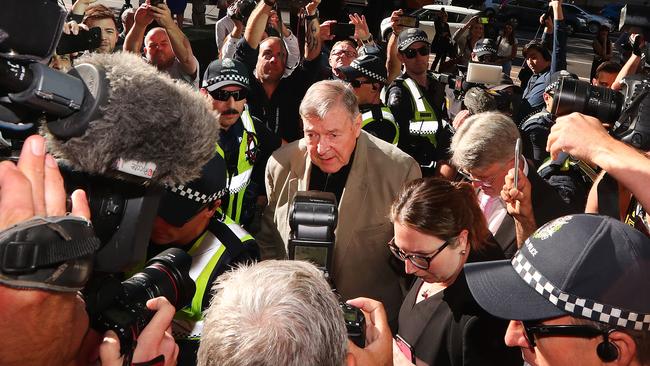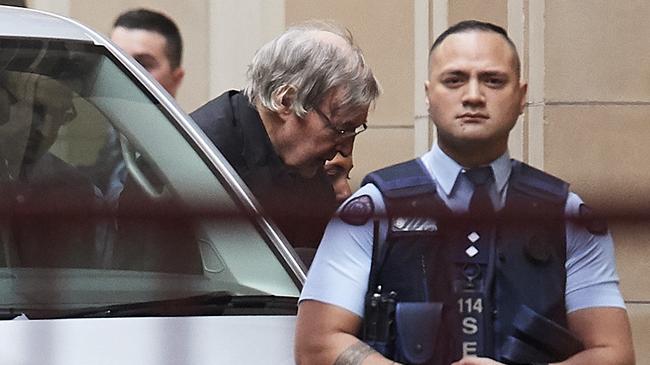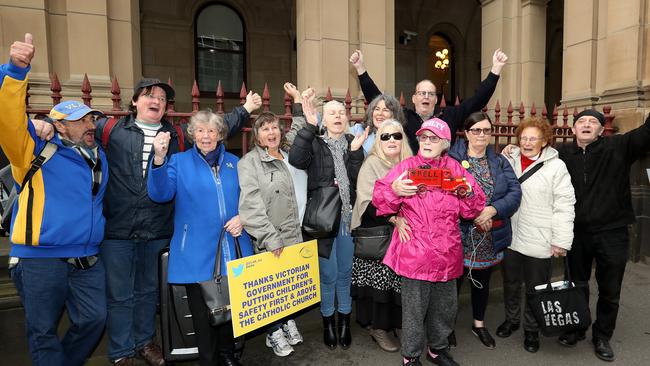George Pell’s accuser was not a ‘liar’ or ‘fantasist’, Victorian court says in dismissing appeal
It was the key piece of evidence that convicted George Pell that his defenders had always questioned. Those doubts were put to rest today.
It was always going to be a tough case.
The prosecution of George Pell for historic child sex offences was based on the word of one man against the vigorous denials of one of the most powerful figures in the Catholic Church.
The events happened more than 20 years ago when the victims were 13-year-old choirboys.
One of the victims died of a drug overdose in 2014 and so there was only one boy left to seek justice for the devastating abuse they had suffered.
Allegations of sexual misconduct had followed Pell around for years but they had never been proven.
But today it was shown that a “witness of truth”, one man now aged in his 30s, could speak out and be believed.
In rejecting Pell’s appeal today, the Supreme Court of Victoria found the testimony of Pell’s accuser was believable and it was not unreasonable for the jury to convict the Cardinal.
In February this year many people were shocked to hear that Pell had been found guilty by a jury in December of child sex offences.
Pell appealed the decision and three judges of the Supreme Court of Victoria were asked to look at the evidence, most particularly at whether the guilty verdict was “unreasonable” given the evidence.
Today, it was revealed that two of the three judges found that it was “reasonably open” for the jury to convict Pell, even though it was based only on the testimony of just one victim.
In delivering the judgment Chief Justice of the Supreme Court Anne Ferguson told a packed court in Melbourne today that Pell’s accuser was “not a liar, was not a fantasist and was a complainant of truth”.
RELATED: Pell’s appeal rejected
RELATED: Pell’s 13 excuses torn to shreds

Chief Justice Ferguson said the three judges watched the evidence given by 12 of the 24 witnesses at the trial, as well as Pell’s voluntary interview with police before he was charged.
The prosecution’s case basically hinged on the fact that the complainant was a “witness of truth” and the jury could have been satisfied beyond reasonable doubt that the events he described had occurred.
Pell’s defence was that the complainant’s story was a fabrication or fantasy and it was implausible, and either literally impossible or was so unlikely there was no realistic possibility it could have happened.
But the court ruled there was nothing about the evidence that meant the jury “must have” had a doubt.
“Justice Maxwell and I accepted the prosecution’s submission that the complainant was a compelling witness, was clearly not a liar, was not a fantasist and was a witness of truth,” Chief Justice Ferguson said, referring to fellow judge Court of Appeal president Justice Chris Maxwell.
“Throughout his evidence, the complainant came across as someone who was telling the truth. He did not seek to embellish his evidence or tailor it in a manner favourable to the prosecution.”
RELATED: Why Pell’s accuser was so compelling
RELATED: Allegations about Pell have followed him for years

She acknowledged there were some things the complainant could not remember but the explanations of why he could not remember “had the ring of truth”.
The judges also accepted there was a “general consistency” of the other witnesses who painted a picture of what occurred at the cathedral before, during and after Sunday mass, during the period Pell was archbishop.
The Chief Justice also said the court had rejected all 13 “solid obstacles” Pell’s lawyers argued meant the offending could not have occurred.
One of these was that it was not possible for Pell’s robes to be pulled to one side, but they found the robes were not so heavy or immovable as suggested.
“Having taken the advantage of the opportunity to feel the weight of the robes, and assess their manoeuvrability as garments, Justice Maxwell and I decided that it was well open to the jury to reject the contention of physical impossibility.
“We found that the robes were capable of being manoeuvred in a way that might be described as being pulled to one side or pulled apart.”
PELL’S ACCUSER RELEASES STATEMENT
In a heartbreaking statement after the appeal decision was announced, Pell’s accuser said he hoped “it is all over now”.
Often referred to as the choirboy, the man gave a statement through his lawyer Dr Viv Waller, who took on his case for free after he made a statement to police four years ago.
“The criminal process has been stressful,” Dr Waller read.
“The journey has taken me to places that, in my darkest moments, I feared I would not return from.
“I appreciate that the criminal process has afforded Pell every opportunity to challenge the charges and every opportunity to be heard. I am glad he has had the best legal representation that money can buy.
“There are a lot of checks and balances in the criminal justice system and the appeals process is one of them. I just hope that it is all over now.”
He said he “felt a responsibility to come forward” after attending his friend’s funeral four years ago.
“I knew that he had been in a dark place. I had been in a dark place,” he said.
“I gave a statement to the police because I was thinking of him and his family. I felt that I should say what I saw and what had happened to me. I had experienced something terrible as a child, and I wanted some good to come of it.
“I would like to acknowledge the courage of those people who reported to the police. For one reason or another, your matters did not proceed. My heart goes out to you.”
The complainant also rejected the suggestion he was out to cause damage to the Catholic Church.
“I am not on a mission to do anybody any harm,” he said.
“Although my faith has taken a battering, it is still a part of my life, and a part of the lives of my loved ones. I am not an advocate. You wouldn’t know my name. I am not a champion for the cause of sexual abuse survivors, although I am glad that those advocates are out there, but that is not my path.”

In February, when other sex abuse cases against Pell were thrown out, the choirboy was “left in the spotlight alone”.
“I asked Viv Waller to help me manage the considerable media interest in the case and to protect my identity and to protect my family,” he said.
“I could not afford legal representation, but that did not matter to her. I will be forever grateful that Viv agreed to help me and to do so for free.
“She has liaised with the media on my behalf. She has allowed the storms of public opinion to buffet her so that my young family could find safe harbour.
“My journey has not been an easy one. It has been all the more stressful because it involved a high-profile figure.”
The choirboy said his privacy was paramount, especially after recently becoming a father.
“I need to be able to define myself away from all of this,” he said.
“Recently, I have started a new chapter in my life as a father. The experiences I have been through have helped me understand what is truly important.”

